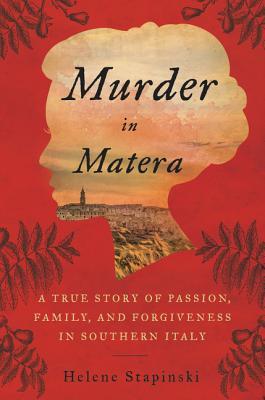 True crime stories are awesome--terrible, but awesome. I just started listening to this amazing podcast, My Favorite Murder, which is both terrifying and fascinating at the same time. I can't stop listening, or looking over my shoulder as I do so to make sure no one is lurking there with a large knife. And so what could be better than a book combining true crime, history, and Italian food?
True crime stories are awesome--terrible, but awesome. I just started listening to this amazing podcast, My Favorite Murder, which is both terrifying and fascinating at the same time. I can't stop listening, or looking over my shoulder as I do so to make sure no one is lurking there with a large knife. And so what could be better than a book combining true crime, history, and Italian food?Murder in Matera is the story of Helene Stapinski's search for her family's fabled murder. She grew up with her mother telling her stories of how her great-great-great (I think) grandmother, Vita, murdered someone in Matera, Italy, and fled to the United States with her children in tow, but lost one of them along the way. Stapinski's family is apparently riddled with criminals, the most notable being her grandfather, Beansie, and she's haunted by a concern that criminality is a genetic trait and that she has passed it down to her children, and so she wants to "solve" the murder in order to figure out what happened...because apparently that will fix it?
There are some awesome things in this book and some things that bothered me. First off, anything involving tracking down a murder--particularly one that took place over a century ago--is interesting. Stapinski had to dig down into the archives of various towns in the region in order to find out what happened--with her great-great-great grandmother, grandfather, the padrone of the region, the children, etc. She speaks some Italian but also hires a few locals to help her as researchers, and struggles with navigating the small-town atmospheres of the places she goes. The scenery is clearly gorgeous and Stapinski captures it well, as she does with the food. This is a book that will make you want to eat Italian food--all the Italian food, from fresh fruit to pasta puttanesca to pizza to--well, absolutely everything. Even foods you don't like will sound good here.
But what I didn't like was when she takes broad liberties with Vita's story. The actual details of the murder are eventually discovered, because they're contained in a court document. But for Vita herself, Stapinski blatantly makes up her thoughts, feelings,a and actions, saying in the afterword that the relied on her "Gallitelli blood and bones" to know what her ancestor would have thought...which is ridiculous. You can't just make up history. The problem is that she wants Vita to be a saint, and so she decides that's how things must have been, without having any evidence of really knowing it. Ascribing emotions and actions to people from the past without having any idea of what they actually did is a classic pitfall in talking about history, and Stapinski blunders into it full-throttle here. These portions do not belong in a work of nonfiction. Additionally, her obsessing about her children's genes got old quickly. Apparently there is one study from Iceland about prisoners (or was it Finland?) that said many who committed violent crimes had a gene tied to aggression, but guess what? You are not your genes! Just because you have a gene tied to aggression doesn't mean you have to kill people! In this way, Stapinski seems to throw her hands up in looking at the past, putting it all down to fate and not looking at responsibility for one's own actions, which really bothered me.
Overall, an okay book that could have been a good book, but strayed past its boundaries and into fiction instead of history too much. The nonfiction portions are excellent, but the "creating stories out of whole cloth" portion left a bad taste in my mouth.
2 stars out of 5.
No comments:
Post a Comment